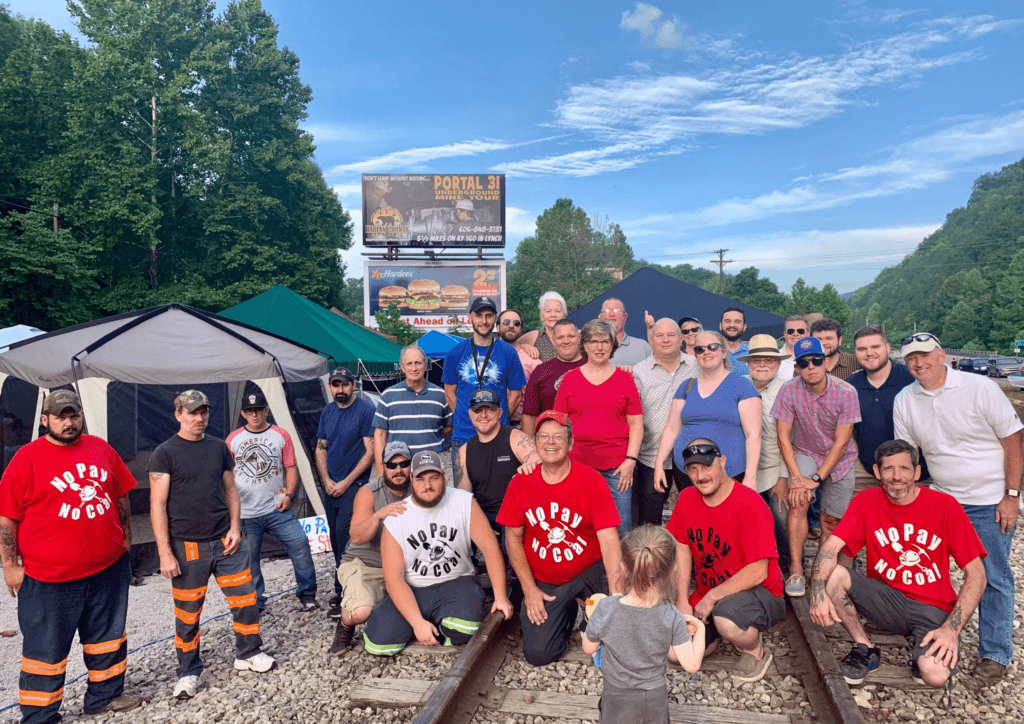CBF Kentucky Shows Solidarity With Protesting Coal Miners

By Bob Allen
August 15, 2019 - Cooperative Baptist Fellowship of Kentucky volunteers from various churches traveled Aug. 4 to Harlan County to join laborers blockading railroad tracks leading to a coal mine that closed abruptly while owing them weeks of back pay.
CBF Kentucky moderator Beth Parker, minister of music at First Baptist Church of Middlesboro, said several members of her church joined groups from Louisville and Lexington to sing, pray and share a devotion with miners protesting layoffs announced after the mining company Blackjewel without warning filed for Chapter 11 bankruptcy protection on July 1.

In all, about 1,700 miners were affected in four states. After paychecks bounced and they were locked out of their 401(k) accounts, a group of miners laid off from the Cloverlick #3 mine in Cumberland, Kentucky, got wind that a 100-car train loaded with nearly $1 million worth of coal that they had mined for free was about to be shipped.
About 20 miners set up camp July 29 to block railroad tracks leading to and from the mine, demanding back pay. Now in its third week, the protest has grown to the point where miners work in shifts to ensure continuous coverage on the track. The act is also garnering widespread community support in a major coal-mining region in the Appalachian Mountains.
Zach Bay, pastor of First Baptist Church of Middlesboro, posted a group photo on Facebook tagging individuals from Kentucky CBF and three churches.
“The miners asked us to help them keep their situation in the public eye by sharing this photo,” explained Bay, a native of Kentucky who attended McAfee School of Theology at Mercer University and served on staff at Northside Drive Baptist Church in Atlanta before moving to Middlesboro in 2013.
“We sang, we prayed, and we encouraged the miners to keep pressing for justice,” Bay said. “Jesus cared a lot about that one.”
The standoff is being compared to a 13-month strike launched in 1973 that brought economic hardship to Harlan County communities and a shootout that resulted in one death. Though the Blackjewel miners are acting without a union, members of the United Mine Workers of America have joined the protest in an act of solidarity.
Harlan County became nationally famous in 1931 as “Bloody Harlan” for a series of skirmishes between union organizers and coal operators that ended in a gunfight between deputized mine guards and miners. At least three guards and one miner were killed, plus an undetermined number of dying and dead who were carried away into the mountains. The current protest is non-violent.
Blackjewel, the nation’s sixth-largest coal producer, reportedly did not post a payment bond, as required by state law, which would have covered a month of payroll for laid-off workers. The closed mine employed more than one quarter of the coal miners in Harlan County, where about one third of the population lives below the national poverty line.
Some miners say their 401(k) contributions hadn’t been properly credited to their accounts for months. The job losses came at a time when the miners’ children were heading back to school.
In addition to the worship service, Parker said, members of the Baptist delegation had opportunities to talk to miners one-on-one.
“The miners were quiet at first, not sure of our intentions,” she said. “We ended up having some meaningful conversations with several people.”
Parker said the group brought along a few bags of supplies, joining many others who were offering things like food, water and school supplies. “They were packing bags for the miners’ families to take home while we were there,” she said.
Parker said the idea for the pilgrimage came from a student at Baptist Seminary of Kentucky who had grown up in Southeast Kentucky.
“His grandfather was a miner,” she said. “When he saw what was happening he wanted to do something. He reached out to CBFKY people and asked them to join him in Harlan.”
“The take away from all we said and did was that we were with them and God was with them,” Parker said. “They are standing up for themselves and also for other groups being mistreated.”
Jordan Conley, the student who organized the gathering and a member of Crescent Hill Baptist Church in Louisville, said it came together quickly. Within 48 hours of being notified, he said, 11 Crescent Hill members found time for the four-hour trek to Harlan County and back.
“Considering the short notice, I had no idea what kind of response to expect,” Conley said. “But, back in the ‘70s, my Pap worked underground at a mine minutes down the same road these men are camped. I knew I had to do something, but the Spirit stirred the hearts of other folks in a way I couldn’t have anticipated.”
“My hope is that our response to this case of injustice might inspire others to stand up for what is right and just,” Conley said. “One voice seems awfully small, but when our voices are united together for justice, we can all play a part in bringing about God’s kingdom.”
The miners are slowly beginning to hear signs of good news. The West Virginia court overseeing the Blackjewel bankruptcy notified participants in the company’s 401(k) plan Aug. 9 they can now either take a cash payout or roll their savings into an IRA.
Kopper Glo Mining, LLC, based in Knoxville, Tennessee, announced Aug. 8 it will be taking over the Blackjewel assets with plans to restart operations that hopefully will bring jobs back to many of the former employees.
“Slowly they are gaining in the conversation,” Parker said Aug. 13. “They are very patient waiting for their pay and whether they will have jobs. They are very intelligent people and mining is their career. It is hard for them to see another way.

